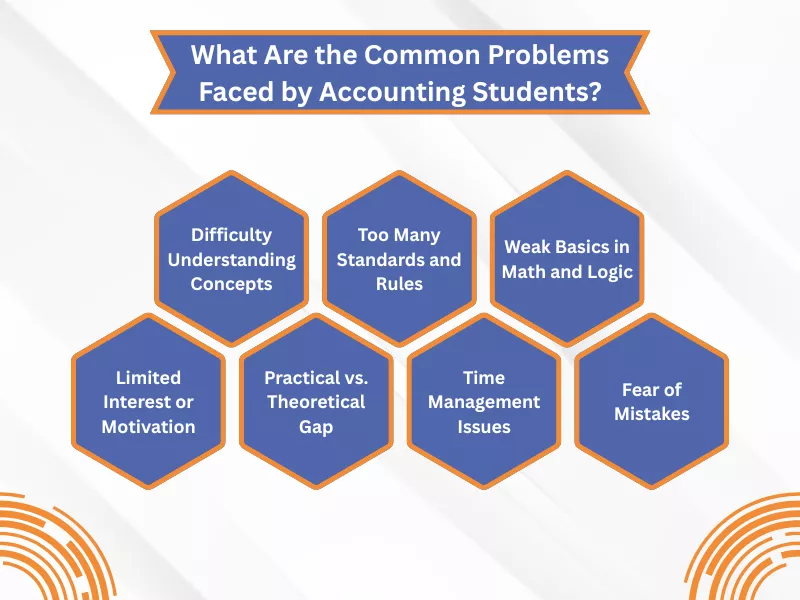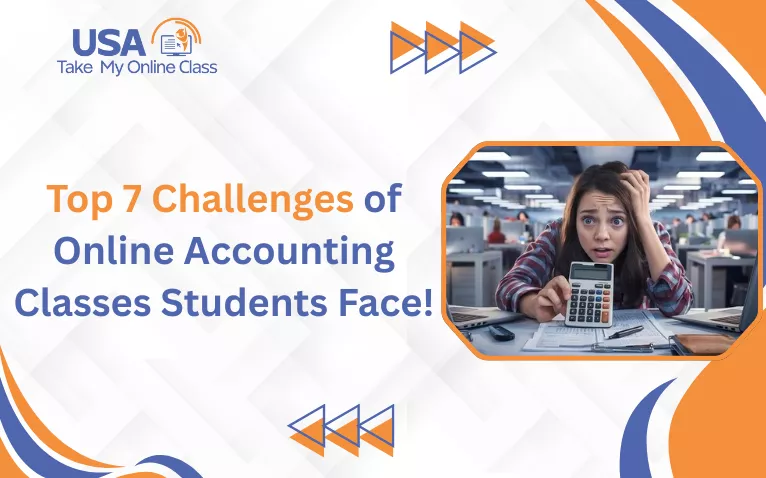Online accounting education quickly turns into a nightmare from a dream! One moment you are learning to manage financial books, the very next moment you are trapped in the account log that never seems to match. Moreover, this higher education course management system might be a boon for your educator, but it’s definitely a curse for online learners due to its complex interface. But is that all?
Well, turns out approximately 33% and 48% students drop out of online accounting classes. So trust us, if you are struggling with an online accounting course, then you are not alone. However, if you think of dropping out, you might be alone, because our research shows that approximately 57% of students hire class takers to help them tackle their online classes. They essentially make the smart decision to ask, Take my online class for me when the academic burden becomes too great.
But why? Well, that’s what we will discuss today! This blog includes the Top 7 Challenges of Online Accounting Classes, tips to tackle, and finally, why so many students turn to online class takers to save them!
Table of Contents
ToggleWhat Are the Common Problems Faced by Accounting Students?

Online learning comes with various problems. If you are someone who is taking an online accounting class, then you might be facing:
Difficulty Understanding Concepts
Most students in online education face one major issue: failing to understand concepts well. Whether online or offline, when students fail to understand concepts well, they do not post queries. Furthermore, you also do not feel confident in answering discussion posts. However, if you do not actively participate in your online discussion posts, you won’t get good grades. Some professors even fail students who do not participate actively.
Too Many Standards and Rules
In introductory accounting, the Economic Entity Principle distinguishes the business as a separate entity from its owners or other businesses. In managerial accounting, the Cost Principle applies, requiring assets and costs to be recorded at their original purchase price or cost. In financial accounting, the Revenue Recognition Principle states that revenues should be recognized in the accounting records when they are earned, not necessarily when cash is received. Accounting requires familiarity with various concepts that can be overwhelming due to their volume.
Weak Basics in Math and Logic
Be it the accounting profession or an accounting class, one must have a solid foundation in math and logic. Most students, even in colleges and universities, constantly struggle with this. However, to improve your career opportunities and succeed in a virtual classroom, you need to have both qualitative and quantitative knowledge. But obviously, we all hate math!
Limited Interest or Motivation
While we all love to sit in class in our PJs, isolation and social distancing, which were once the most essential steps to combat social stigma, became the most painful realities of the online environment. This has led to the biggest challenge: a loss of motivation. Without face-to-face interaction, both accounting teachers’ and students’ engagement decreases. For optimal results in online classes, both teachers and students must engage.
Practical vs. Theoretical Gap
There is often a disconnect between theoretical knowledge taught in courses and practical applications in real-world accounting scenarios, leaving students unprepared. Most accounting educators and faculty members believe that it is one such difficult challenge that messes up the online learning experience. Furthermore, the world of automation fails to bridge this gap even with chatbots.
Time Management Issues
Procrastinators, show yourself! If you say that you do not procrastinate, you are lying. Students, even in the accounting field, procrastinate; therefore, facing time constraints is common. However, time management for online accounting students is essential. In order to complete your classes properly, your time management skills must be on point.
Fear of Mistakes
Accounting involves precision, and the fear of making mistakes can hinder learning and confidence, especially in high-stakes assessments. Your curriculum is already tough; on top of that, you fear classmates will judge you for your mistakes. This hampers the collaborative learning environment, whether synchronous or asynchronous, creating a greater challenge for everyone.
Now that we have successfully understood your challenges, let’s check out the tips for accounting students taking online courses to ease the pain!
7 Tips for Students Taking Online Accounting Courses

Create a Study Schedule
First, create a study table to help you audit your coursework. Also, do stick to it. Making the schedule will not get you an A; following it will!
Stay Patient and Positive
In distance learning, most think they will complete all classes at once. However, this does not help. Furthermore, it will induce fatigue. Also, did you know that increased screentime affects your mental health during online classes?
Practice After Every Topic
To improve your understanding and ace your classes, you must practice every day. In MyLab Accounting, you can view the data analytics to target your grey area and invest extra time to learn the concepts. You can also use the non-graded quiz to improve your knowledge.
Participate in Discussions
One of the best ways to Stay Motivated During Online Classes is by participating in discussion posts. Don’t be afraid to make mistakes. Student engagement is essential, and your instructor will understand better if you come clean about your conceptual understanding.
If your course uses Canvas, Blackboard, or Moodle
If your instructor asks you to reflect on readings or share impressions:
- You can post your summary and opinion (like the “helpful but biased” analysis) as your main discussion response.
- Then, you can reply to classmates by agreeing or adding how you personally manage similar challenges (e.g., “I also struggle with time management, and setting reminders helped me.”).
Stay Consistent with Classes
Consistency is key to mastering accounting concepts. Even if you feel confident about a topic, skipping sessions can make it harder to connect ideas later. Treat your online classes as seriously as in-person lectures—log in regularly, complete assignments on time, and review lessons weekly to keep information fresh in your mind.
Be Active and Take Notes in Class
Online learning can easily make you passive, but active participation boosts comprehension. Take structured notes while watching lectures—summarize formulas, journal entries, and key concepts in your own words. This helps reinforce learning and provides a valuable reference for exam prep. You can also ask questions in real time or during office hours to clarify doubts right away.
Use Real-Life Accounting Examples
Accounting becomes easier when you connect theories to real-world situations. Try relating topics like budgeting, depreciation, or financial statements to actual businesses or your own finances. Reading company annual reports or practicing with real data will make abstract ideas more concrete and strengthen your analytical skills.
How to Succeed in Online Accounting Classes with an Expert's Help?
No need to change your perception regarding online classes, challenges are common in both types. Your one-stop solution for all problems: Take My Online Class for Me!
Hiring experts or accounting faculty to help you with your course provides you with the expertise and work experience that simplifies your concepts, manages your time effectively, and improves your grades.
USATakeMyOnlineClass has a deep bench of 100+ faculty of economics and accounting holding PhD degrees. They not only uphold student satisfaction but also help you meet tight deadlines.
Furthermore, they guarantee a minimum B grade. With them by your side, you can quickly complete your coursework and improve your practical skills.
Conclusion
While your expectations regarding the online accounting class might be all beautiful, the reality is far from it. But that does not have to stop you from succeeding in online classes. We believe these top 7 tips will help you tackle the top 7 Challenges of Online Accounting Classes. And when you can’t do it alone, hire experts and succeed without a second thought.
Frequently Asked Questions
Are Online Accounting Degrees Respected by Employers?
Yes — as long as the program is accredited and offered by a reputable institution. Employers today value skills and credentials over the learning format. In fact, completing an online degree shows discipline, time management, and self-motivation — all traits valued in accounting roles. Make sure your program is recognized by accreditation bodies such as AACSB, ACBSP, or IACBE to ensure it meets professional standards.
How Do I Get Help When I Don’t Understand Accounting Online?
Don’t hesitate to reach out — support is available in many forms. Use your instructor’s virtual office hours to clarify concepts, and participate actively in discussion boards to get peer insights. Many platforms, like MyLab Accounting, also include interactive tutorials and guided examples. Additionally, joining online study groups or tutoring sessions can provide a collaborative space to work through difficult problems.
How Do I Prepare for Professional Accounting Exams When Learning Online?
Create a focused exam preparation plan early in your program. Start by understanding the structure of exams like CPAs, CMA, or ACCA, and align your coursework with their content areas. Use online prep tools, CPA journals, practice tests, and review courses to simulate exam conditions. Dedicate weekly time to revision and reinforce weak topics using analytics or progress trackers. Consistency and early preparation are the keys to success. All this will help you learn how to become a good accounting student!
How Can I Improve My Accounting Calculation and Spreadsheet Skills Online?
Practice is the best way to build accuracy and speed. Use tools like Excel, Google Sheets, or QuickBooks Online to simulate accounting scenarios. Many free and paid online tutorials can guide you through financial modeling, formulas, and data analysis. Try recreating journal entries, ledgers, and financial statements in spreadsheets to strengthen both your technical and conceptual understanding.

